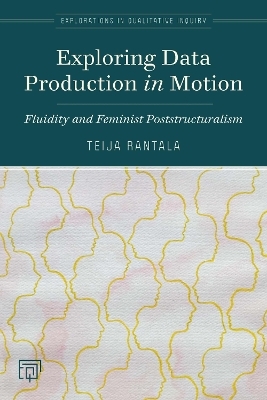
Exploring Data Production in Motion
Myers Education Press (Verlag)
978-1-9755-0115-0 (ISBN)
Exploring Data Production in Motion facilitates the use of feminist critical qualitative methodologies. With open-ended methods and poststructuralist theory and analysis, this book will offer tools to approach and to examine challenging and controversial topics ethically. This book will argue that to examine data of “individual” experience and aspirations requires examining the process of the data production in which these were “produced”. Therefore, this book will form an understanding of a data production as a process, which in its fluidity enables us also to form an understanding of difference and change as inevitable parts of social processes. Movement expresses here the dynamic forces in the data production (including its analysis), which produce “the life” to the lines of the data. It welcomes change and uncertainty by allowing the data production processes, its intensities and fluctuations, to take the lead in the inquiry. This compels the methods to adjust to the requirements of the data production processes. The book demonstrates the use of feminist methodology and illuminates how the feminist critical inquiry is essential in examining issues of minority and difference. In this the focus is in the differences. As a feminist inquiry this book contributes to recognizing differences within while examining minority worldviews and perceiving difference as essential force in striving for sustainable ethics in the times of political polarization.
Teija Rantala earned her Master's in Education and Ph.D. in Gender Studies at the University of Helsinki. In her doctoral study she explored the aspirations of religious women belonging to a minority movement in Finland and used feminist methods and poststructuralist theory to be able to examine the women's controversial aspirations. She has published her work mostly in feminist educational journals. The publications reflect her feminist, creative but critical approach to methodology and knowledge formation. She has a special interest in examining processes of gender, identity, aspirations and experience by experimenting with feminist poststructuralist and posthuman theory. She has given invited lectures at the University of Aberystwyth and University of Reading and reviewed for SAGE and Routledge.
List of Illustrations; Acknowledgments; Introduction; References
Section 1: Fluid Critical Qualitative Methodologies
Chapter 1: Motion and Fluidity in Feminist Critical Social Inquiry
1.1. Movement in methodology; 1.2. Fluidity; 1.3. “Subjects” of situated knowledges; References
Chapter 2: Feminist Poststructuralist Methodologies as Escape
2.1. What is feminist poststructuralism; 2.2. Feminist writing practices; 2.3. Memory work and collective biography
2.4. Collaborative data production; References
Section 2: Fluid Methodologies in Specific Contexts
Chapter 3: Overview of the Method
3.1. A brief contextualization of the study; 3.2. The data production; 3.3. Fluidity and movement in the feminist data production; References
Chapter 4: Composing Processual Analysis
4.1. Reading the data with concepts and theories; 2. Schizoanalysis; References
Chapter 5: The Movements of Lines
5.1. Flowing lines; 5.2. Breaks in the flow: Relational and sexual configurations; 5.3. Temporary formations; 5.4. Brief summary on the lines; References
Section 3: Final Thoughts on Critical Research in Motion
Chapter 6: The Possibilities and Challenges of the Methodologies in Motion
6.1 The aftermaths of fluid feminist critical social inquiry; 6.2 Some future possibilities and challenges of fluid methodologies in critical social research
References; Glossary
| Erscheinungsdatum | 02.07.2019 |
|---|---|
| Reihe/Serie | Explorations in Qualitative Inquiry |
| Sprache | englisch |
| Maße | 152 x 228 mm |
| Gewicht | 220 g |
| Themenwelt | Schulbuch / Wörterbuch |
| Informatik ► Datenbanken ► Data Warehouse / Data Mining | |
| Sozialwissenschaften ► Pädagogik ► Schulpädagogik / Grundschule | |
| Sozialwissenschaften ► Politik / Verwaltung ► Politische Theorie | |
| Sozialwissenschaften ► Soziologie ► Empirische Sozialforschung | |
| ISBN-10 | 1-9755-0115-2 / 1975501152 |
| ISBN-13 | 978-1-9755-0115-0 / 9781975501150 |
| Zustand | Neuware |
| Haben Sie eine Frage zum Produkt? |
aus dem Bereich


